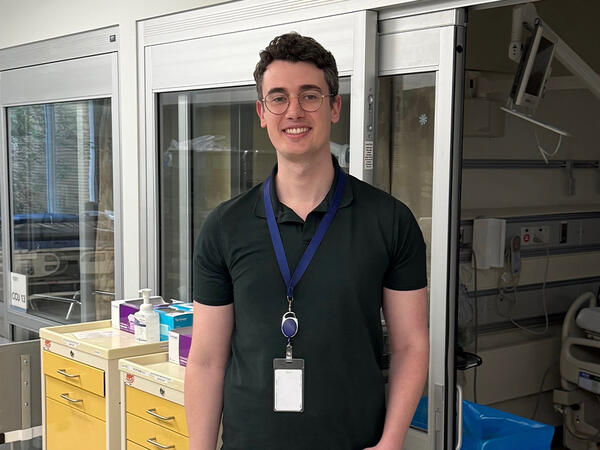Pilot funding from Centre for Practice Excellence supports research to improve community pharmacist integration in patient care teams
Two research projects supported through pilot funding from the Centre for Practice Excellence (CPE) at the Leslie Dan Faculty of Pharmacy have generated a better understanding of how community pharmacists can be integrated into care teams for patients with complex medication needs. The two projects highlight the importance of communication and trust between different health care providers to improve quality of care for patients.
In one of the projects, Sara Guilcher, Assistant Professor, and Jennifer Lake, Lecturer, explored community pharmacist involvement in integrated health networks previously funded by the provincial government as a way to improve care for patients with complex needs. These networks, called Health Links, connected primary care teams, home care teams and hospitals in a small geographical area, but rarely included community pharmacists.
Yet patients with complex needs, who often take multiple medications, usually have more frequent contact with community pharmacists than other health care providers. Including pharmacists in integrated networks would enhance communication and collaboration with the other health care providers, allowing pharmacists to leverage their accessibility and expertise to improve the quality of patient care.
Guilcher and Lake’s team interviewed pharmacists, clinicians and decision-makers about the benefits and barriers to including pharmacists in integrated networks. They found that health care professionals saw great value in including community pharmacists, but some had concerns around how this would be done, patient privacy, and perceptions of community pharmacists’ conflict of interest.
Lake says one significant challenge is that the large number of community pharmacists in a given geographical area makes it difficult for clinicians to build trusting relationships with them – that is, they trusted individual pharmacists to provide patient-centred care, but that did not necessarily translate to community pharmacy as a whole.
“When clinicians and decision-makers talked about pharmacists they worked with, they said a lot of really positive things. People see value in including a pharmacist in the network,” she says. “But it’s difficult for clinicians to connect with a large number of community pharmacists, instead of one person they know and trust.”
While the Health Links model is no longer funded by the Ontario government, insights from the study support the inclusion of pharmacists in any type of integrated health care model.
“The health care landscape in Ontario will include integrated care models and networked organizations for the foreseeable future,” says Lake. “Our findings suggest the importance of including community pharmacists in networks and improving communication between different health care professionals to benefit patients.”
Project highlights importance of intraprofessional communication
In the other CPE-funded project, Lisa McCarthy, Associate Professor, and Guilcher evaluated an approach to improve communication between hospital and community pharmacists when patients are discharged from hospital.
“There is no consistent process. Different hospitals and communities have informal ways of handing off patients, and sometimes there is no communication at all,” says McCarthy.
“Our stakeholders – people practicing in the community – told us what they needed and we designed a protocol to improve communication during this transition.”
The resulting model, the Pharmacy Communications Project (PROMPT), is simple by design: at the time of discharge, the hospital pharmacy faxes a “discharge package,” which includes the patient’s prescription, medical discharge summary and pharmacist contact information to the patient’s community pharmacy, then follows up with a phone call to answer any questions.
“The model had to fit within current workflows in both settings and couldn’t be too high tech,” says McCarthy. “We wanted to use existing information sources and integrate them into existing workflows and see what happened.”
With support from the CPE as well as the Canadian Society of Hospital Pharmacists and Canadian Foundation for Pharmacy, McCarthy and Guilcher used hospital data and interviews with pharmacists to better understand how pharmacists used PROMPT, and their perspectives on its feasibility and effectiveness.
They found that most pharmacists felt that the increased communication would improve patient care by allowing community pharmacists the opportunity to discuss prescriptions with the hospital pharmacist and address any questions or potential issues. On the other hand, some had concerns about the increased workload and privacy issues associated with use of faxes. McCarthy and Guilcher’s team will use these insights to improve the PROMPT model to use in different settings.
CPE advances research and education in pharmacy practice
Both projects address practical issues in community pharmacy practice and highlight the need for stronger intra- and inter-professional communication to better support patients.
“Our Seed Funding initiative was designed to provide support for promising initiatives aimed at enhancing the quality, impact and value of pharmacy practice initiatives. We also wanted to jump-start research teams with promising ideas to help them secure larger competitive external project funding,” says Zubin Austin, co-leader of the CPE.
“The two successful applications were practical, led by experienced researchers, demonstrated a high level of intra- and interprofessional collaboration and held the greatest promise for general applicability to the profession and the health care system.”
Guilcher says that the CPE funding for both projects was critical for her teams to better understand the roles of community pharmacists in the health care system. “Community pharmacists are one of the most accessible health care professionals in the community, particularly for more marginalized individuals in society,” she says. “Community pharmacists are critical players in the health care system, and our research reinforced the role of community pharmacy practice in enhancing care quality for Ontarians.”
By: Eileen Hoftyzer
More News
Image

Welcoming Ivy Lam as Academic Lead in Climate, Health & Sustainable Care
Assistant Professor Lam will guide the Leslie Dan Faculty of Pharmacy's efforts to embed environmental sustainability across the Faculty.
Read More
Image

Pharmacy alum’s research shows how full-scope practice improves cancer care
Honoured with a national award, Adrian de Boer says his residency experience was a powerful reminder that he's making a meaningful change to the pharmacy profession.
Read More
Image

Pharmacy alum passionate about helping community pharmacists practice to full scope
As a pharmacy leader at Rexall, Heidi Wittke uses frontline experience to lead initiatives that improve patient care
Read More
